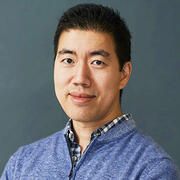
The pioneer of laboratory evolution and precision-editing of genetic code earns the title of AAAS Fellow
On Tuesday, November 24, the American Association for the Advancement of Science (AAAS) announced this year's newly elected members. David R. Liu, the Thomas Dudley Cabot Professor of the Natural Sciences, a Howard Hughes Medical Institute Investigator, and member of the Broad Institute earned the lifelong distinction of AAAS Fellow along with about 500 scientists.
The title recognizes "important contributions to STEM disciplines, including pioneering research, leadership within a given field, teaching and mentoring, fostering collaborations, and advancing public understanding of science."
AAAS started electing members in 1874, honoring some of the most influential scientists and inventors in history, including Thomas Edison (1878), sociologist W. E. B. Du Bois (1905), anthropologist Margaret Mead (1934), computer scientist Grace Hopper (1963), physicist Steven Chu (2000), and astronaut Ellen Ochoa (2012). This year's Nobel Prize winner in chemistry, Jennifer Doudna, is also a AAAS Fellow.
Liu, who was inducted into the National Academy of Medicine just last month, earned his Fellow status for "pioneering advances such as base editing and DNA-encoded libraries that creatively integrate chemistry, evolution, and molecular biology to impact medicine and the life sciences."
In short, Liu invented base editing, a technique that chemically alters DNA, letter by letter, rather than cutting through the genetic code. More precise and flexible, the technique introduces far fewer off-target edits than others, bringing gene-editing technology closer to correcting incurable human genetic diseases like sickle cell anemia, progeria (a fast-aging disease), and cystic fibrosis.
"We're incredibly excited by the fact that there are human genetic diseases caused by point mutations that might be treatable and perhaps even curable by using base editors." |
- David Liu |
Most recently, Liu performed a feat that even Doudna's popular CRISPR-Cas9 gene editing tech couldn't reach: He made targeted changes to the genomes of mitochondria, the power sources for cells. Mutations in mitochondrial DNA can harm the nervous system and muscles, including the heart, and can be fatal to people who inherit them. Liu's discovery enables researchers to study these hard-to-reach errors and start to work out how to correct them.
Mitochondrial DNA is only the latest advance in a string of crucial discoveries: In the last year, he created BE-Hive, a new machine learning model, to predict which base editor performs best to repair thousands of disease-causing mutations; used base editing to correct recessive genetic deafness and restore partial hearing; and tweaked base editors to make fewer off-target edits and access more locations on the genome than earlier versions.
"There's a lot of hard work that still has to be done," Liu said in a video interview with the Camille Dreyfus Foundation, "but we're incredibly excited by the fact that there are human genetic diseases caused by point mutations that might be treatable and perhaps even curable by using base editors."
Liu is the ninth current faculty member in the Department of Chemistry and Chemical Biology to be elected a AAAS Fellow. The Association will honor him and the other newly elected Fellows in a virtual ceremony on February 13, 2021. Honorees will receive official certificates and rosette pins in gold and blue, colors symbolizing science and engineering.
